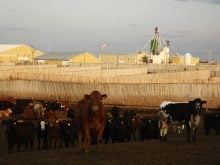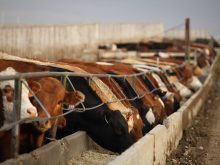GROSSE ISLE, Man. – The Manitoba Cattle Producers Association is crediting the federal agriculture minister for getting Canadian beef back into the world market.
At a recent media briefing, association officials said Gerry Ritz’s visits to foreign countries and his lobbying to reopen closed markets and gain new ones is putting more dollars into producers’ pockets.
“It’s getting the job done,” MCPA federal-provincial relations manager Ryder Lee said in an interview.
“There’s only so far you can go at certain levels and having ministers step in has results.”
Read Also

Canadian-bred cow wins World Dairy Expo Holstein show
A cow bred in Saskatchewan, Lovhill Sidekick Kandy Cane, is the Grand Champion Holstein at the 2025 World Dairy Expo.
MCPA directors also applauded Ritz’s efforts to open markets, saying it’s the best form of support they can get from Ottawa.
Lee said he believed Ritz had helped increase access to Hong Kong, Jordan and Saudi Arabia by meeting with senior officials in those places.
Ritz also helped expand access to other markets, Lee added.
Last week Ritz was in Peru and Colombia, countries with which the government has signed trade agreements but that Parliament has not yet ratified.
He was accompanied by representatives of several agricultural organizations, some of which released supportive statements.
“Free trade agreements with Peru and Colombia will help keep pulses competitive in these markets and open new opportunities for us,” Pulse Canada chief executive officer Gordon Bacon said in a news release.
The beef industry has been particularly affected by trade barriers because of the worldwide reaction to the discovery of BSE in Canada in 2003. Markets around the world shut their doors and many have still not eased restrictions, such as South Korea.
Lee praised Ritz and the federal government for pushing South Korea for access and then taking it to the World Trade Organization when it refused to budge.
He also said Ritz’s willingness to go overseas and have face-to-face discussions with foreign officials is having an impact that lower-level negotiations would never have.
“There are a lot of jurisdictions where what they need is someone like minister Ritz sitting across the table assuring them that our systems are what we say they are, and that the products that we send them are safe, and that they’re the quality they’re looking for,” Lee said.
“It gets the machinery of government going.”
Lee said Canadian beef market access is still not back to the level it had reached before the discovery of BSE. But slow and sure work is bringing the industry closer to normal.
“We got clobbered by BSE but every door we open brings us back up a bit,” Lee said.















